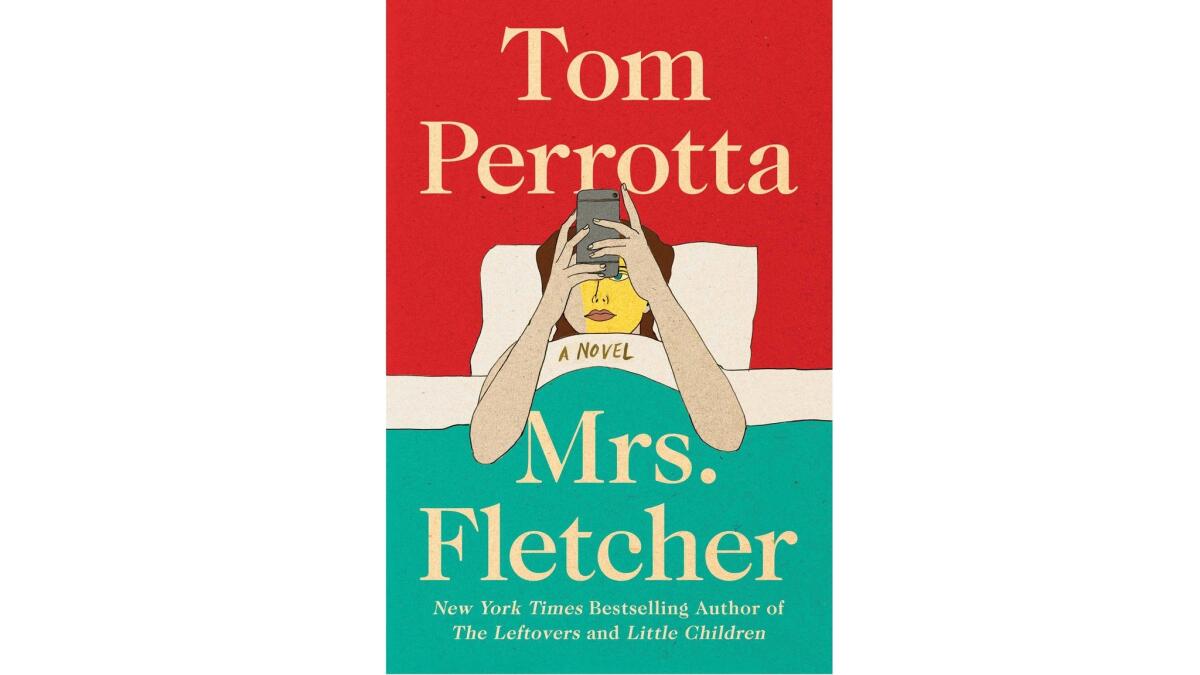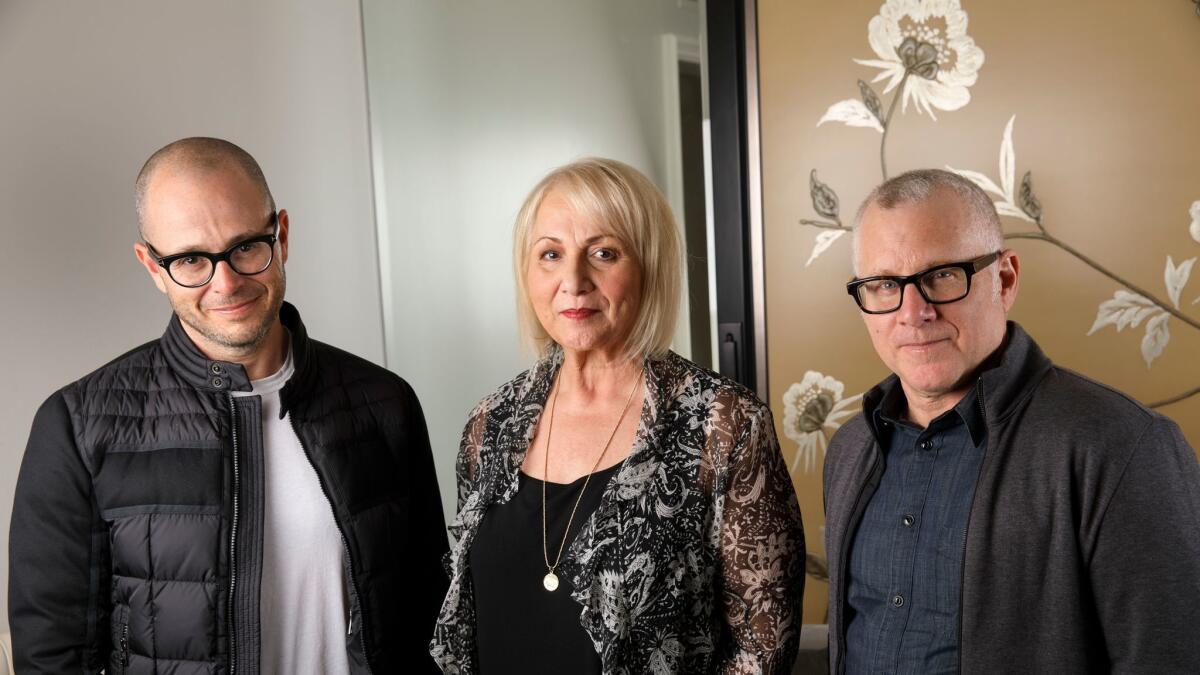Tom Perrotta on sexual freedom and his new novel, ‘Mrs. Fletcher’
- Share via
When Tom Perrotta and his wife, Mary Granfield, sent their second child off to college two years ago, they found themselves navigating a brand new life stage. “Parenting becomes this career,” he says. “You’re in the thick of it, and then suddenly it’s – not quite over, but it doesn’t take up a huge amount of space anymore, and there’s a sense of reassessment of one’s adult life.”
This transition is at the heart of his new novel, “Mrs. Fletcher.” One scene describes a group of women whose friendship began “on the sidelines at soccer games, at school plays and award ceremonies and graduations, a whole era of their lives - it had felt so permanent while it was happening — suddenly behind them. Just a chapter, and not the story itself.”
Once children grow up and leave home, the book makes clear, whole other aspects of life reassert themselves. “I was talking with a friend about it once, about being an empty nester,” Perrotta says. “So my friend looked at me and said, ‘Yeah, the pressure to have sex is enormous!’”
Perrotta laughs at the memory. We’re talking by phone; Perrotta is in his house in a tree-lined Boston suburb, the kind of place in which most of his books are set. As in “Election” and “Little Children,” the novel explores the ways ordinary people try to make sense of their unruly desires. Here, an eponymous main character, Eve, is a single mother who sends her only child off to college and finds herself in the midst of a personal (and sexual) revolution.
All about Eve
Eve takes a community college course on gender and sexuality and meets a diverse and enticing crop of new friends. “Eve actually ends up having the college experience that she’s hoping her son will have,” Perrotta says. “She meets new people. She’s confronted with ideas that she hasn’t really explored and she’s excited by what she finds. She takes chances that she wouldn’t have taken any other time in her life.” That includes watching pornography online.

Her son, Brendan, a former high school jock, finds college life unsettling, especially when he runs afoul of new expectations around consent and sexual justice. “I think young men like Brendan, who used to feel like the world was kind of designed for their pleasure, are discovering that people are pushing back against it,” Perrotta says. That pushback, delivered by a female classmate, sends Brendan back home to live with his mother just as she’s learning to enjoy her new freedom.
“Brendan isn’t particularly likable,” he admits. “I wasn’t thinking about
I think that gender has become one of the revolutions of our lifetime.
— Tom Perrotta
Two ideas came together as he was writing, Perrotta says. “One was that sense of midlife reinvention, and the other was that I had been thinking a lot about the way porn has changed the way Americans have sex.” People in Brendan’s generation, Perrotta points out, “have grown up in a heavily porn-influenced environment. But I think anybody now who is out in the dating world is dealing with all sorts of changes wrought by technology: One of them is Internet porn, and the other is all these dating apps.”
Pornography’s changing role
It’s a rapid generational change that fascinated Perrotta. “I feel like my sexual experiences are nothing like my parents’ and my kids’ sexual experiences differ from mine in so many ways as well,” he said. For middle-aged parents of college-aged offspring, he added, it can all feel unsettling. “People aren’t really sure what’s going on out there. Some people take it in stride, and some people seem horrified by the thought of it.”
For Eve, the introduction to porn begins with a salacious text from a number she doesn’t recognize, a secret admirer who calls her an acronym for a sexy mom.
“Eve’s at a point in her life where she’s no longer sure what her identity is. She’s feeling adrift,” Perrotta says. “And this word, this [sexy mom] label, gets pinned on her. It suddenly becomes a temporary identity that allows her to move more confidently in the world. It sort of eroticizes the world, and gives her sexuality back to her.”
“There was a billboard in L.A. that you’d see coming out of the airport,” -- Perrotta split his time between Los Angeles and the East Coast during his HBO series “The Leftovers” – “it was something like, ‘Mercedes I’d Like to…’ I can’t remember what the [last word] was!” he says with a laugh. And, he adds, “If you go into the world of porn, it’s like one of the most prevalent categories. Porn divides sexuality into a million categories, and that’s a really important one, a very popular one.”

Perrotta, who grew up in a Catholic neighborhood in New Jersey, writes about pornography with gleeful curiosity. “I remember [porn] had that powerful forbidden quality and it was sort of mesmerizing to me,” he recalls. “I got to college, and there was a really sort of strong critique that felt porn was exploitive to women and degrading and kind of a dirty economic system. And I accepted that, and I didn’t look at it.” But then came the Internet. “And suddenly porn was available online, and some part of me was like, ‘Hey, let’s see what that is!’ ”
For a writer, he adds, it was amazing. “It just seemed like all this human information,” he says. And for his character, Eve, watching porn is a “breakthrough. After that the world starts to become very erotic. She starts to sense the possibility of all these scenarios that she would never have even noticed before.”
The novelist as TV writer
Perrotta, whose “The Leftovers” became a critically acclaimed three-season series for HBO, is currently in talks to explore adapting “Mrs. Fletcher.”
“One of the reasons I wanted to go into TV was that I was feeling that I was spending a little too much time in my room. And I got what I wished for. I was part of a team; I had a workplace to go to.” Collaborating with “The Leftovers” series co-creator Damon Lindelof and fellow writers like Patrick Somerville was “exhilarating and also humbling,” Perrotta says. After his time with the show ended, he adds, “It took a while to recapture the rhythms of my quiet life.”
Writing female characters
From his breakthrough comic novel “Election” through the HBO adaptation of “The Leftovers” and now “Mrs. Fletcher,” Perrotta has become our most reliable chronicler of the contemporary American marriage. “I think that gender has become one of the revolutions of our lifetime,” he says. “I’ve been interested in the breakdown of masculinity, the loss of confidence that men have had in who they are and where they belong.” Still, as memorable as his male characters can be, it’s in women that he finds the most inspiration. “I’ve been really fascinated with women of my generation and the ways that they’ve navigated — not the first feminist generation, but they were the first generation where feminism was really entrenched. It’s been interesting to watch their lives unfold.”
“I know as a writer it’s dangerous sometimes to try and write outside of your own identity,” he admits. “It’s what I’ve been doing for a long time. I write women characters. I just need to find a way in so that I feel comfortable with my imagining a character and then it’s up to a reader to decide if that character feels real or not.”
Sign up for our Book Club newsletter
Get the latest news, events and more from the Los Angeles Times Book Club, and help us get L.A. reading and talking.
You may occasionally receive promotional content from the Los Angeles Times.




